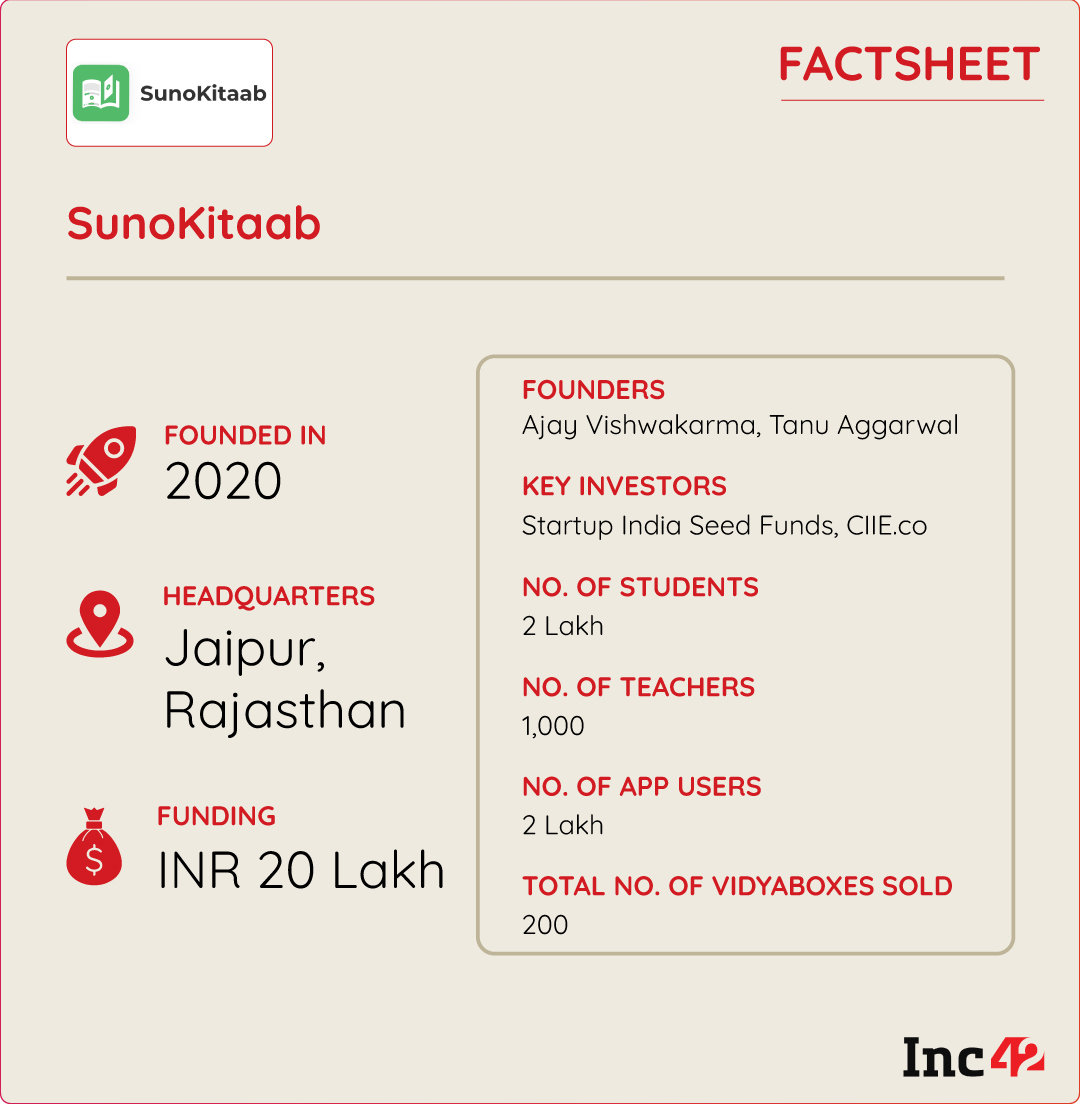[ad_1]
Launched in January 2020, edtech startup SunoKitaab provides academic content in the form of audiobooks and podcasts
Its audio learning counters excessive screen time and has played a key role in empowering more than 30,000 visually impaired students
At a time when hybrid learning has become a buzzword in the edtech space, SunoKitaab is already catering to both offline and online learners in the audiobook market that is expected to become a $35 Bn opportunity by 2030
While working with schools in Rajasthan, under a fellowship programme, in 2019, tier II educators and childhood friends Ajay Vishwakarma and Tanu Aggarwal realised that there was a serious dearth of skilled teachers and resources — both essential for quality education — for students.
To bridge this gap, Vishwakarma and Aggarwal made it their mission to change the face of academics with a cost-effective solution that could play a key role in upgrading academic standards and ensuring quality education for all.
At the outset, the duo would record chapters in a creative and appealing fashion and share them with teachers on WhatsApp groups — a strategy that was a hit among students.
This vision paved the way for what many students today know as SunoKitaab. Launched in January 2020, the edtech startup provides academic content in the form of audiobooks and podcasts. On its website, it claims to have a compendium of more than 10K lectures in English and Hindi for students studying in Classes I to XII and the ones preparing for competitive exams.
It is pertinent to mention here that just a few months after its launch, the startup received a major boost in its user base as Covid-19 wreaked havoc across the globe.
While on the one hand, the pandemic gave a significant thrust to many edtech business models, as everyone was forced to stay in the confines of their homes, it, on the other hand, unearthed many unique challenges for students.
For starters, the students with enough resources to study online were exposed to the harmful effects of longer screen time. In contrast, students hailing from the hinterlands of the country, or the ones with little resources to study online, lagged in their studies.
At this point, the founders took inspiration from a music audio player, Caravaan, and launched an audio player for academic studies called ‘VidyaBox’ in 2022.
“Our academic audiobooks and podcasts bridge the gap between videos and written content, providing an accessible and engaging way to consume educational materials. We are helping students get access to valuable resources with zero screen time,” the cofounder and CEO of SunoKitaab, Vishwakarma, said.
The cofounders’ efforts to make education accessible have been well-received by both students and teachers. As a result, the startup today boasts having a user base of 2 Lakh students and 1,000 teachers.
Not just this, SunoKitaab has successfully raised INR 20 Lakh from Startup India Seed Funds, Centre for Innovation, Incubation and Entrepreneurship (CIIE). Notably, the startup has also received immense backing from the Rajasthan government’s iStart initiative.
“iStart programme has provided us with invaluable support, including mentors and essential infrastructure,” Vishwakarma said.

SunoKitaab’s Humble Beginnings
At the outset, when the cofounders decided to embark on their journey to make available academic courses via audio means, they knew that the road they wished to take wouldn’t be a bed of roses as they lacked the technical skills to pursue their mission.
Another major pain point was a serious dearth of funds. However, the duo took a great leap of faith with just INR 1.5 Lakh in hand, and as they stepped forth into uncharted territory, they met Gurkaran Singh.
As the chief technology officer, Singh has played a pivotal role in building the SunoKitaab website and app.
Once the startup’s tech stack was ready, the cofounders leveraged platforms like Google and Facebook, along with content marketing campaigns to target its audience.
“This increased our visibility and engagement, ultimately aiding in attracting and acquiring new learners for SunoKitaab,” Vishwakarma said.
Interestingly, Vishwakarma gives credit to the rise of non-music audio platforms for the success of SunoKitaab. The platforms that played a key role in inspiring the CEO to offer quality education to one and all are homegrown names like Audible Suno, Pocket FM, Khabr, and Kuku FM, just to name a few.
In fact, Kuku FM is the closest competitor to SunoKitaab in the space. For context, Kuku FM has a range of educational content on various subjects on its platform.
A Deep Dive Into SunoKitaab’s Playbook
The non-music audio OTT approach has worked wonders for SunoKitaab to emerge in the edtech space. SunoKitaab offers a repository of audio content like recorded lectures and summaries. Their playbook has been to reduce screen time and internet dependency.
This has made SunoKitaab a preferred platform for students who do not want to spend hours staring at computer screens for learning.
On the other hand, SunoKitaab’s VidyaBox has proved to be a game changer for students in the rural areas of the country. This is because VidyaBox is not only cost-effective but also gives access to offline learning in a creative vogue.
Vishwakarma claims that VidyaBox has been adopted by 70% of school students who do not have the internet, smartphones, or personal computers.
The educational content provided via VidyaBox has been curated by 1,000 teachers and subject experts. The device helps students with ease of learning in different languages.
These teachers record their voices to provide educational content in VidyaBox. Post the first recording session, a team of audio editors and subject experts reviews the recorded content to ensure the sound and content quality before it’s made available on the platform/device.
Another aspect of ensuring content quality is to keep it relevant and up-to-date. For this, the startup takes regular student feedback and closely monitors school and state board syllabi.
All the recording sessions take place in the in-house studio equipped with the necessary audio equipment. This allows the startup to have full control over the content creation process.
The content can be tailored to suit the distinct needs and preferences of different students, with ongoing efforts to make it even more student-specific.
To customise the content in VidyaBox, the startup provides a form on the website to take the details of the academic needs of the students. Based on the input fed by the students, the curriculum is recorded and delivered to the students. It takes a maximum of seven days to deliver the device to the students and the costs for which are incurred by the startup.
Vishwakarma claims that the platform has empowered many visually impaired students by providing them access to education through its audio content. He said, “Over 30,000 visually impaired students have benefited from SunoKitaab and more than 1 Lakh students in rural areas have gained access to quality education, showcasing the startup’s meaningful contribution to education.”
Moving on, the cofounders also started a fellowship in 2019 which continued after SunoKitaab’s inception. Fellows collaborate with schools to demonstrate the usage of VidyaBox across Tier II and III regions. Eligibility criteria for the fellowship require the candidate to be a graduate with strong communication skills.
The startup generates revenue by selling audio devices, app subscriptions and content creation.
What’s Next For SunoKitaab?
SunoKitaab is dedicated to expanding its audio content across various education boards in multiple regional languages. The startup’s objective is to optimise the learning journey by giving easy access to quality education.
“Audiobooks are gaining momentum as students and parents recognise their value in education. Audio offers quality content without the need for visuals,” Vishwakarma said.
He believes that the country’s rural areas, including Tier II and Tier III cities and towns, represent a huge market for edtechs today. Not just this, even the quality of education in these areas will get a major overhaul if edtech founders shift their focus from Tier I towns and cities to these high-potential smaller regions.
At a time when hybrid learning has become a buzzword in the edtech space, SunoKitaab is already catering to both offline and online learners. While we cannot ignore the strides that the startup has made since its inception a few years ago, there are areas that SunoKitaab can work on.
For instance, its VidyaBox device is priced at INR 3,999, which is a lot of money for students hailing from the rural areas of the country and could defeat the founders’ vision to extend high-quality education in these regions. Realising this, the startup has partnered with Simpl for a buy now pay later option and also provides EMI options.
As of now, it remains to be seen if the edtech will be able to secure a juicy chunk of the audiobook market, which is expected to touch $35 Bn by 2030, especially when a majority of edtech startups are looking to pivot to survive.
Disclaimer: This article is part of Inc42 and the Government of Rajasthan’s initiative to shine a spotlight on the state’s emerging startups.
[ad_2]
Source link





